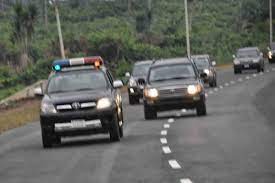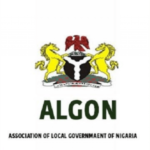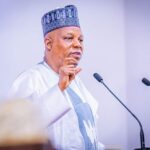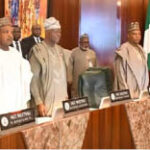Governor Charles Soludo of Anambra State says the issue of long convoys by governors was discussed at the last National Executive Council (NEC) meeting.
The meeting, which held at the Presidential Villa in Abuja on Thursday, was chaired by Vice-President Kashim Shettima.
Addressing State House Correspondents after the meeting, the governor said the meeting also encouraged government officials to cut-back on the cost of governance in their various spheres.
“That we mustn’t live, even the cost of running the state, the way we even live, someone gave an example of a state governor going with 20-something vehicles in a convoy and all these have to be fuelled, and so on and so forth.”
Anambra: Lady beaten to death, body dumped in hotel’s pool
Senate raises alarm over erosion, ocean surge in Edo, Anambra, Ondo
“Hey gentlemen, we would need to be sensitive to the times; we need to live within the average of the people that we’re governing, and so on and so forth, and knock off the waste and the irrelevancies, so to speak.”
Speaking on the cash transfer scheme to cushion the effect of subsidy removal, Soludo said it was not possible to digitally transfer money to the poorest of the poor the majority of whom are unbankable as beneficiaries of the supposedly transferred cash could not be identified in the villages.
He said NEC resolved that the states should come up with their own registers using formal and informal means to develop it, assuring that all beneficiaries at the subnational level could easily be accessed that way.
“We need to face the problem of the fact that we don’t have a credible register,” he said.
Soludo said the current National Social Register failed integrity test as some members described it during the meeting as “bogus” and “fathom”.
“I think at the council today, there was almost near unanimity among members. That there’s a big question mark about the integrity of the so called National Social Register. We have questions about how those names in the register were brought about and I’m sure one question I hear asked is where it is for the most vulnerable group, and so on and so forth.”
“The poorest 25 per cent of Nigerians are largely if not totally unbanked, and they don’t have access to your telephone. It is of the poorest of the poor of our society.
“What we have put out here are things that will encourage the tiers of government to implement in accordance with their respective fiscal space and fiscal capacities, the federal, state and local governments.
“I want to highlight as well, there is quite some fiscal surplus that will be coming to the states and local government and the federal government and we suggested that it will be nice that you can implement cash transfers, subject to your financial capacity, peculiarities, some might be able to do one, some might be able to do 10. Some might be able to do 20 as the case maybe. It depends on their own capacity.
“Maybe some that are not even in a position to do that now. For example, if you have a state that is owing salary arrears, workers have been owed for three years, or for four years. The priority now is to even start paying down some of the salary arrears or where pensioners have been owed their pension and gratuity for seven years for example, the priority now might be to use part of the surplus to pay them.
“Then, there are also states that are with bumper harvests and that will say you know what I want to deploy a chunk of this to implement cash transfer and several of the other immediate programs and that’s why we couched this point, that this is ultimately still a federation.”

 Join Daily Trust WhatsApp Community For Quick Access To News and Happenings Around You.
Join Daily Trust WhatsApp Community For Quick Access To News and Happenings Around You.


